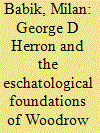| Srl | Item |
| 1 |
ID:
108275


|
|
|
|
|
| Publication |
2011.
|
| Summary/Abstract |
This essay seeks to demonstrate the eschatological foundations of Woodrow Wilson's foreign policy during and after World War I through his neglected relationship with George D. Herron, a millennialist theologian and one of the leaders of the Kingdom Movement in American Protestant Christianity. After a brief synopsis of Herron's life and teachings, it provides a detailed exposition of his eschatological reading of the Great War and America's role in it: Herron portrayed the conflict as the final battle between Christ and Satan, Wilson as a divinely appointed messiah, and the League of Nations as the secular fulfillment of the Kingdom of God. Subsequent sections trace the relationship between Herron and Wilson through their correspondence and reveal that the president repeatedly endorsed Herron's interpretation as expressive of his own views. The conclusion reflects on some of the main implications of Wilson's relationship with Herron for the theory and practice of liberal internationalism then and now.
|
|
|
|
|
|
|
|
|
|
|
|
|
|
|
|
| 2 |
ID:
126715


|
|
|
|
|
| Publication |
2013.
|
| Summary/Abstract |
This essay bridges the standard divide between traditional realist and critical IR theory by demonstrating their unity in the international thought of E. H. Carr. In recent times, numerous scholars have challenged Carr's mainstream disciplinary image as a traditional realist, seeking to dissociate him from realism and narrate him as a proto-critical theorist instead. However, this has implicitly reinforced the divide between the two perspectives and obscured their fusion in Carr's thought. In contrast, this essay does not deny Carr's realism, but rather reveals how it expressed a distinctly critical theoretical consciousness. Focusing primarily on his attacks on liberal statecraft and liberal historiography in, respectively, The Twenty Years' Crisis and What Is History? it demonstrates that his analyses manifested key critical theory elements, including anti-positivist epistemology, counter-hegemonic tendencies, Western Marxist ideology critique and sociology of knowledge, and a commitment to progressive human emancipation from self-imposed constraints.
|
|
|
|
|
|
|
|
|
|
|
|
|
|
|
|